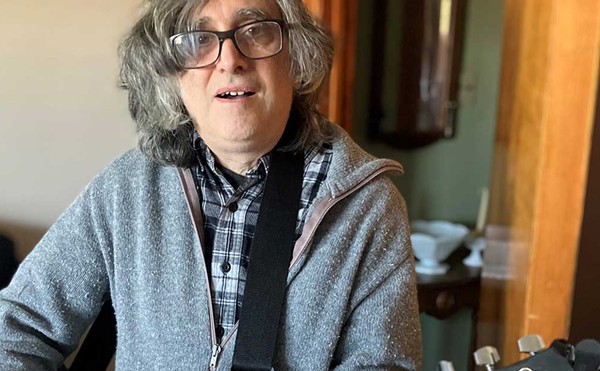They say that great musicians play like a dream. In the case of Richard Davis, one of the finest bassists in jazz or any genre, the playing began as a sort of dream.
“My first bass was a broomstick. I practiced on it for six months. I just imagined that I was playing the bass,” the 73-year-old bassist reminisced during a phone call from his home in Wisconsin.
Money was tight growing up in Chicago during the Depression, but Davis eventually lucked out, finding a wallet containing $7 in his school’s practice room — and a way to purchase a real bass.
“I took it to the musical director … and he told me that if nobody claimed it within a week or two that I could keep it. That was a big amount of money back then.”
And young Richard was on his way to being the player of his dreams.
But even while pretending, Davis never wanted to sound like other bass players. Davis was determined to be unique.
“I admired Wilbur Ware and the great Jimmy Blanton, but I didn’t want to sound like them. I wanted to be just as great,” Davis says.
Few would argue that he hasn’t reached that goal. He has played on 340 albums by his own count. Just in the pop field, he’s worked with artists from John Lennon to Frank Sinatra; he’s on both Bruce Springsteen’s Born to Run and Van Morrison’s Moondance.
He’s worked extensively in the world of European classical music, and is said to have been Igor Stravinsky’s favorite bass player.
And these are essentially moonlighting gigs away from his main work in jazz.
As a teenager, he frequented the Regal Theatre where he saw Earl “Fatha” Hines, Count Basie and Duke Ellington.
At 15, he took lessons from Walter Dyett, the musical director at DuSable High School who played a formative role in an orchestra’s worth of notable jazzmen from the Windy City.
After graduation, he studied classical bass during the day. At night, he performed at cabaret parties.
He worked with pianist Ahmad Jamal in Chicago, then with pianist Don Shirley in New York before his big break came and he joined Sarah Vaughan in the mid-’50s.
“I went to the University of Sarah Vaughan. That’s what I tell people when they ask me where I went to school. At the time, she had the best players in her band. She had [pianist] Jimmy Jones and [drummer] Roy Haynes. I couldn’t have been in better company.”
Davis stayed with a Vaughan for five years. Then he crossed paths with multi-instrumentalist Eric Dolphy.
“I met Eric in the subway in New York. He just came up to me and asked me what I was doing next week. I told him ‘Nothing.’ He invited me to play with him at the Five Spot. Eric and I became best friends.”
But that was only one of a number of brilliant musical friendships that Davis struck up beginning in the mid-’60s, when his free but impeccable sense of timing and brilliant bowing technique made him one of the most noteworthy players on the scene. He made classic recordings with Dolphy, Jaki Byard, Booker Ervin and others during the boundary-pushing “new thing” era — and has ever since.
And as a leader, he’s produced a series of good-to-breathtaking records, often using the bowed bass as lead instrument much as one would feature a trumpet or saxophone. The Bassist: Homage to Diversity, released on the Palmetto label in 2001, is the most recent proof of his prowess at gliding the bow across strings as lightly as someone tickling a kid’s arm with a feather.
For all he’s done, Davis is not particularly comfortable talking about his accomplishments. He makes you believe they were just a series of chance encounters — like running into Dolphy on that subway.
Davis has few regrets. Turning down an offer to work for John Coltrane is one of them. “He wanted me to work with him. When he asked, I walked away from him. I was just in awe of him,” Davis admits.
Davis doesn’t plan to slow down. Currently, he teaches music at the University of Wisconsin in Madison, where he’s been a professor since 1977. He still maintains a heavy playing schedule, however, and this weekend brings him back to Detroit to work with guitarist Spencer Barefield, with whom he’s collaborated since the ’80s. Also on his calendar: In January and March he’ll return to New York for a project dedicated to the late composer and trumpeter Thad Jones of Pontiac.
See Richard Davis with guitarist Spencer Barefield, pianist Kenn Cox and drummer Djallo Keita on Friday at 6:30 and 8 p.m. at the Detroit Institute of Arts (5200 Woodward, Detroit; call 313-833-7900). Performance is free with museum admission. The group also performs Saturday at the Harlequin Café (8047 Agnes, Detroit; call 313-331-0922).
E-mail Charles L. Latimer at [email protected].




